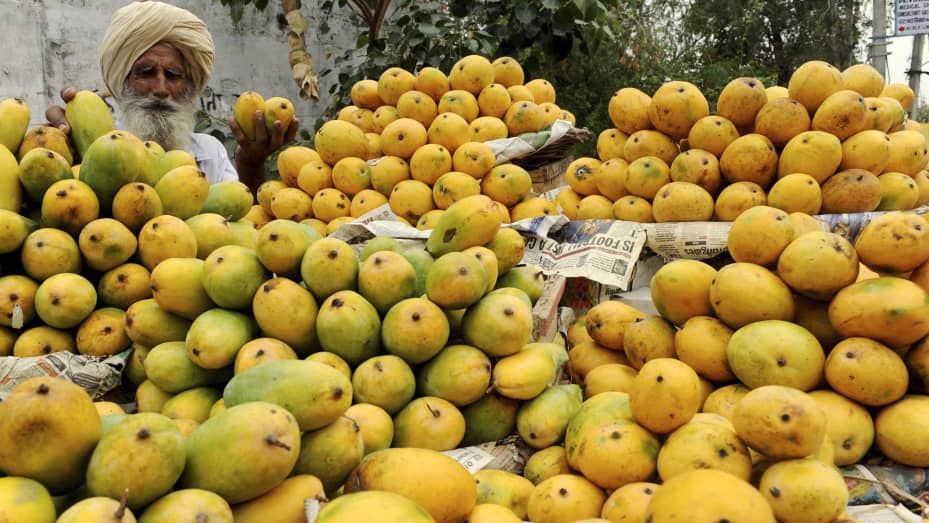A bite-sized history of India's beloved mango
Across India, the arrival of summer heralds not just rising temperatures but a much-anticipated season – mango season. The vibrant yellow hue of mangoes adorning street vendors' carts, the intoxicating fragrance wafting through kitchens, and the sweet, juicy taste that bursts with every bite – these are the sensory delights that define this beloved fruit. But the story of the mango in India extends far beyond its deliciousness, interwoven with history, culture, and a touch of extravagance.
Also read: Beyond blessings: A foodie's pilgrimage to Ayodhya (travellernook.com)
History of mangoes
Historians believe the mango originated in the region between Myanmar, Bangladesh, and northeastern India. According to Professor Peter Grierson, a renowned botanist and scholar of South Asian flora, "fossil evidence suggests the presence of mango trees in the Eocene epoch, around 50 million years ago." Genetic studies further substantiate this theory, placing the origin of the modern mango cultivars in Southeast Asia. It is believed that the fruit arrived in India around 4,000 years ago, possibly through trade routes or natural migration. The earliest written reference to mangoes comes from the 3rd century BCE, where they find mention in Sanskrit texts.
Royal Indulgence
Emperors of ancient India cultivated a deep appreciation for mangoes. The Mauryan emperor Ashoka (304-232 BCE) is said to have planted mango groves along highways for weary travelers, as mentioned in the writings of Greek diplomat Megasthenes. Centuries later, Mughal emperors like Akbar (1556-1605 CE) further popularized mangoes, incorporating them into royal feasts and cultivating new varieties. The Mughal court physician and scholar Abu'l Fazl, in his magnum opus Ain-i-Akbari, documented over 100 different types of mangoes grown in the Mughal empire.
Legendary status
Certain mango varieties have achieved legendary status in India, not just for their taste but also for their exorbitant prices. The Alphonso mango, grown in the Ratnagiri district of Maharashtra, is widely considered the "King of Mangoes." Its unique sweetness, intense aroma, and vibrant color have earned it a global reputation. In 2010, an Alphonso mango from Ratnagiri fetched a record price of Rs. 1 lakh (approximately $1,300 USD) at an auction, highlighting the extreme value placed on this prized fruit. Another coveted variety, the Miyazaki mango from Japan, has also been known to sell for thousands of dollars due to its limited production and exquisite taste.
Different types of mangoes
India boasts a staggering diversity of mango varieties, each with its own distinct characteristics. The Alphonso, as mentioned earlier, is prized for its sweetness. Langra mangoes offer a perfect balance of sweet and tart, while Chausa mangoes are known for their creamy texture and rich flavor. For those who prefer a tangy experience, the Neelam mango is a popular choice. Some varieties, like the Totapuri, are best enjoyed pickled or used in chutneys. This incredible variety ensures that there's a perfect mango for every palate.
Beyond Taste
The mango is deeply embedded in Indian culture. It is considered an auspicious fruit, often offered during religious ceremonies and used in traditional rituals. In many parts of India, the first mango of the season is offered to deities as a gesture of gratitude. Mango leaves are also used to create decorative torans (door hangings) that symbolize prosperity and good luck. Mango wood, known for its beauty and durability, is used in furniture and other artisanal crafts. Not only this families gather for mango-centric feasts, children relish the sticky delight of mango pulp dripping down their chins, and kitchens across the country buzz with the activity of preparing mango-based desserts like aam panna (a refreshing drink) and aamras (a thick, pulpy concoction). So, the next time you bite into a juicy mango, take a moment to appreciate its rich history, the cultural significance it holds, and the sheer delight it brings.
Also read: Ladoo: An Indian sweet with a hidden history (travellernook.com)
.png)
